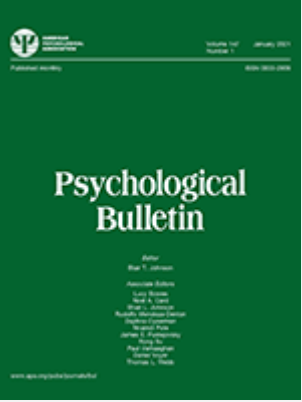Intuitive deontology? A systematic review and multivariate, multilevel meta-analysis of experimental studies on the psychological drivers of moral judgments.
IF 19.8
1区 心理学
Q1 PSYCHOLOGY
引用次数: 0
Abstract
Humans often face moral dilemmas posing a conflict between two motives: deontology (rule-following, e.g., "thou shalt not kill") and utilitarianism (greater-good-maximization, e.g., sacrificing one for many). A long-standing debate concerns the influence of cognitive processing on moral judgments in such dilemmas. One popular dual process account suggests that intuition favors "deontological" judgments, whereas "utilitarian" judgments require more reflection. We conducted a comprehensive multilevel, multivariate meta-analysis to assess the cumulative evidence favoring intuitive deontology, its heterogeneity within and across studies, and its robustness to bias. Following established standards, our search for published and gray literature identified 731 unique effects nested in 139 studies from 80 reports meeting our eligibility criteria. Overall, we found a significant but small effect favoring intuitive deontology (OR = 1.18, 95% CI [1.10, 1.26]; p < .0001). We also observed substantial effect heterogeneity stemming from differences within and between studies. Results were robust to outliers, and we found no consistent indications of publication bias. Our preregistered exploration of various moderators resulted in significant explanation of the residual variance by manipulation and dilemma type, with the highest effects of intuitive deontology found for studies using foreign language or induction manipulations and the footbridge dilemma. In a post hoc analysis, restricting the data set to dilemma actions requiring personal force and instrumentality, we found an increased effect of intuitive deontology (OR = 1.30, 95% CI [1.19, 1.42]). Results question the universality of intuitive deontology, inform current discussions on the effect's underlying mechanisms, and call for more carefully designed studies testing the effect. (PsycInfo Database Record (c) 2025 APA, all rights reserved).直观的义务论?对道德判断心理驱动因素实验研究的系统回顾和多变量、多层次荟萃分析。
人类经常面临道德困境,导致两种动机之间的冲突:义务论(遵守规则,例如,“你不应该杀人”)和功利主义(更大的利益最大化,例如,牺牲一人为多人)。在这种困境中,认知加工对道德判断的影响是一个长期存在的争论。一种流行的双重过程解释表明,直觉倾向于“义务论”判断,而“功利主义”判断则需要更多的反思。我们进行了一项全面的多水平、多变量荟萃分析,以评估支持直觉义务论的累积证据、研究内部和研究之间的异质性及其对偏倚的稳健性。按照既定的标准,我们对已发表文献和灰色文献进行了搜索,从80份报告的139项研究中发现了731种独特的效应,符合我们的资格标准。总的来说,我们发现直觉道义的影响显著但很小(OR = 1.18, 95% CI [1.10, 1.26];P < 0.0001)。我们还观察到由于研究内部和研究之间的差异而产生的实质性效应异质性。结果对于异常值是稳健的,我们没有发现一致的发表偏倚迹象。我们对各种调节因子的预登记探索结果通过操纵和困境类型对剩余方差进行了显著的解释,直觉义务论在使用外语或归纳操纵和人行桥困境的研究中发现了最高的影响。在事后分析中,将数据集限制为需要个人力量和工具的两难行动,我们发现直觉义务论的效果增加(OR = 1.30, 95% CI[1.19, 1.42])。结果质疑了直觉义务论的普遍性,为当前关于该效应潜在机制的讨论提供了信息,并呼吁进行更仔细设计的研究来测试该效应。(PsycInfo Database Record (c) 2025 APA,版权所有)。
本文章由计算机程序翻译,如有差异,请以英文原文为准。
求助全文
约1分钟内获得全文
求助全文
来源期刊

Psychological bulletin
医学-心理学
CiteScore
33.60
自引率
0.90%
发文量
21
期刊介绍:
Psychological Bulletin publishes syntheses of research in scientific psychology. Research syntheses seek to summarize past research by drawing overall conclusions from many separate investigations that address related or identical hypotheses.
A research synthesis typically presents the authors' assessments:
-of the state of knowledge concerning the relations of interest;
-of critical assessments of the strengths and weaknesses in past research;
-of important issues that research has left unresolved, thereby directing future research so it can yield a maximum amount of new information.
 求助内容:
求助内容: 应助结果提醒方式:
应助结果提醒方式:


